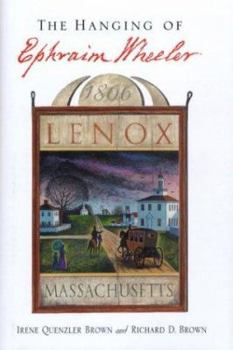The Hanging of Ephraim Wheeler: A Story of Rape, Incest, and Justice in Early America
Select Format
Select Condition 
Book Overview
In 1806 an anxious crowd of thousands descended upon Lenox, Massachusetts, for the public hanging of Ephraim Wheeler, condemned for the rape of his thirteen-year-old daughter, Betsy. Not all witnesses believed justice had triumphed. The death penalty had become controversial; no one had been executed for rape in Massachusetts in more than a quarter century. Wheeler maintained his innocence. Over one hundred local citizens petitioned for his pardon--including,...
Format:Hardcover
Language:English
ISBN:0674010205
ISBN13:9780674010208
Release Date:April 2003
Publisher:Belknap Press
Length:388 Pages
Weight:1.30 lbs.
Dimensions:1.3" x 5.8" x 8.4"
Customer Reviews
2 ratings
A new crime had been added to the catalogue of crimes
Published by Thriftbooks.com User , 21 years ago
It was so horrendous a crime that one of the judges exclaimed, when pronouncing the death sentence, that "a new crime had been added to the catalogue of crimes."These were the words that a condemned Ephraim Wheeler heard, when in 1805 in Lennox, Massachusetts, he was sentenced to be hanged for raping his thirteen year old daughter, Betsy. Historians Richard D. Brown and Irene Quenzler Brown's book, The Hanging Of Ephraim Wheeler, recount in micro-history format not only the trial, but also the sociological, political, moral, ethical, historical, legal as well as psychological elements that surrounded the trial and played a role in the eventual conviction and hanging.In essence, the authors explore subjects that are both repellant and fascinating reflecting deeply American roots as to what constitutes right and wrong.What was quite noteworthy about this unusual trial is that the jury `s conviction had been based on non-corroborative evidence, as well as the fact the victim had never been physically examined by the appropriate authorities.Moreover, according to the authors, it was apparently the only case that they were aware of in early America, where a mother had sustained her daughter's successful prosecution of a father.Although, as is pointed out, that to gentlemen and farmers rape was tantamount to murder, the debate pertaining to capital punishment was just as controversial and divisive in 1805 as it is today. In fact, owing to the gravity of the punishment, it was very rare during early America that the charge of rape, particularly against your own daughter, was the preferred recourse.Generally, legal authorities at the time were more inclined to bring forth a lesser charge of lewd and lascivious conduct and incest against the accused. The latter crimes did not carry with them capital punishment. From 1787 to 1826 there were only six executions in the County of Berkshire, where the trial had taken place, for capital offenses.We are informed "in the generation leading up to 1806 in Massachusetts, and throughout the United States, it had become almost unthinkable to hang a man for the crime of rape, so powerful was the movement toward Beccarian reform. But now in Massachusetts, following the reformer's failure to remove rape from the state's capital list in 1805 and 1806, execution was deemed not only lawful but also acceptable."What makes for intriguing reading are the authors' masterful descriptions and analysis of the principal actors of the crime and trial. The accused, who barely made a living and had in the past tried to rape his daughter, the victim, a young teenager who certainly was brave in deciding to reveal all, and the wife, who was the first to summon the authorities in order to have her husband arrested.Readers are also vividly exposed to the courtroom arena and its various players, such as the three judges, the prosecuting attorney and the defense attorneys, all of whom were not only influenced by their legal training but also
history with a twist
Published by Thriftbooks.com User , 21 years ago
A great read. The authors' dynamically combine history and conventional issues while telling the story of a misfortunate man and his family in the 1800's. This book does a fabulous job of examining the politics of law and their relation to capital punishment.






